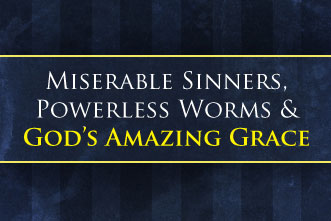Are you lovable?
This apparently bizarre question pops up over and over again in Christian worship and theology. It was posed to me recently by a friend and I promised to reply here.
It is a commonplace in Christian hymnody to disparage ourselves as a device to magnify the grace of God in saving us.
“Would [Christ] devote that sacred head for such a worm as I?” asks Isaac Watts, one of the best hymnwriters ever.
In the same generation, Jonathan Edwards likens our souls to spiders that God holds over the hearth, barely able to restrain his disgust as he kindly spares us despite our repugnant natures.
More recently, C. S. Lewis compares the act of God becoming human in Jesus with the act of a human being diving down into deep water to become a slug, and elsewhere (in Mere Christianity) he straightforwardly says, “really there is nothing else in us to love” besides our sheer selfhood—which Lewis fails to explain as a cause for God to love us.
Clearly, there is a big “ick factor” here, a sense of repellence, that is supposed to underscore God’s generosity toward us.
The Apostle Paul takes a different tack:
You see, at just the right time, when we were still powerless, Christ died for the ungodly. Very rarely will anyone die for a righteous person, though for a [thoroughly] good person someone might possibly dare to die. But God demonstrates his own love for us in this: While we were still sinners, Christ died for us. Since we have now been justified by his blood, how much more shall we be saved from God’s wrath through him! For if, while we were God’s enemies, we were reconciled to him through the death of his Son, how much more, having been reconciled, shall we be saved through his life! (Romans 5:6-10 TNIV)
This approach has always helped me make sense of the paradox of God’s love for us, bad as we are.
One can coherently condemn one’s enemies for their faults, oppose their mischief and resist them even to death, without judging them to be utterly without merit, completely devoid of anything admirable or even lovable. Many a story, in fact, revolves around the familiar phenomenon of, yes, love/hate relationships.
It seems more biblically, experientially and rationally sensible to me, then, to sort things out this way:
1. Despite the ravages of the Fall, of the effects of others’ influences on our lives, and of our own bad choices, we are not entirely devoid of the goodness of the image of God.
2. The second Great Commandment tells us to love others as we love ourselves. Presumably, then, our love for ourselves is not utterly groundless, completely out of keeping with the reality of our own unlovableness.
Lewis seems to get into psychological difficulty here in Mere Christianity as he says we automatically love ourselves just because we are ourselves, and this love is what we ought to emulate as we love others.
But why would such an automatic love, if groundless, be justified? It sounds, at best, non-rational/reflexive and even actually crazy if we are, in fact, bereft of lovable qualities. Lewis also fails to reckon with the widely reported phenomena of people hating themselves or, conversely, loving themselves because they consider themselves quite wonderful—neither of which case, I’m sure he would agree, is what the Commandment has in view.
So what does proper self-love mean? That’s what we need to get straight.
3. God loves the world (John 3:16 and many more verses, thank God!). Now perhaps God loves the world proleptically, anticipating how wonderful we will become, how truly lovable we will be once he has rescued us, restored us and trained us in godliness. Maybe—but that doesn’t sound like God loves us present tense but loves our future selves and puts up with us now as future-selves-in-the-making.












